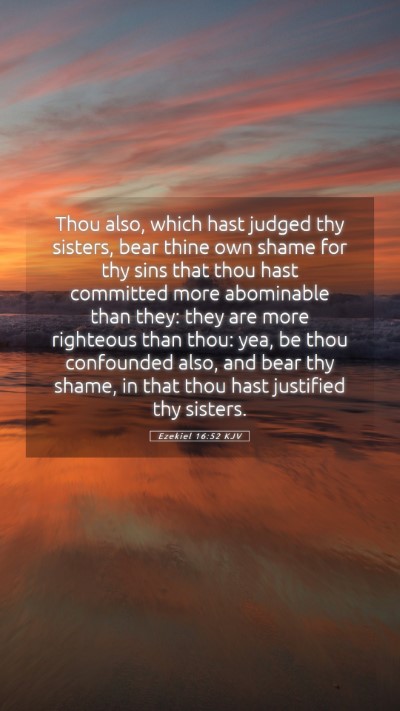Bible Verse Interpretation: Ezekiel 16:52
Verse: Ezekiel 16:52 states, "Thou also, which hast judged thy sisters, bear thine own shame for thy sins that thou hast committed more abominably than they: they are more righteous than thou: yea, be thou confounded also, and bear thy shame, in that thou hast justified thy sisters."
Summary of Insights
This verse serves as a severe admonition to Jerusalem, represented symbolically as a sister to Samaria and Sodom. The central theme revolves around the judgment and moral failure of the people of Jerusalem, where they are confronted with the reality of their sins compared to those of their neighboring cities.
Historical Context
The context of Ezekiel's prophecies lies in the Babylonian exile of the Israelites. The chapter addresses the people's unfaithfulness and idolatry, which have led to divine judgment. Ezekiel, the prophet, uses the metaphor of a wayward wife to depict Israel's relationship with God.
Commentary Insights
- Matthew Henry: He emphasizes the depth of Israel's iniquities and contrasts their plight with that of Sodom and Samaria. Henry notes that the people of Jerusalem have justified their sins while condemning others, highlighting the danger of hypocrisy.
- Albert Barnes: Barnes elaborates on the shame and moral accountability that Jerusalem must face. He comments on the necessity of recognizing one's sins in order to reach repentance and restoration, drawing attention to the reality that those judged worse might still be more righteous in comparison.
- Adam Clarke: Clarke reflects on the moral implications of Jerusalem’s actions and the insistent call for them to acknowledge their shame. He emphasizes the importance of recognizing how one's actions can merit judgment, framing it within the broader scope of divine justice.
Meaning of Bible Verses
This verse highlights several key elements:
- Moral Reflection: The need for self-examination and acknowledgment of one's sins.
- Consequences of Sin: The reality that all have fallen short, yet some will face greater judgment due to more egregious transgressions.
- Judgment and Righteousness: Understanding that God’s justice encompasses not just punishment but also the opportunity for redemption through repentance.
Application of Scripture
Ezekiel 16:52 has significant implications for personal application:
- Self-Examination: Encourages individuals to reflect on their own lives and actions rather than merely judging others.
- Accountability: Reminds believers of the standards of righteousness they are called to uphold, aligning their lives more closely with God's desires.
- Grace and Repentance: Highlights the importance of seeking forgiveness and the power of grace that leads to transformation.
Bible Study Insights
For those engaging in Bible study or seeking deeper understanding, this verse offers rich material:
- Group Discussions: Use this verse as a starting point for conversations about the nature of sin and accountability. How can hypocrisy manifest in modern life?
- Personal Reflection: Take time to meditate on personal areas of sin and the call to grace through repentance.
- Scriptural Cross-References: Consider related verses such as:
- Isaiah 3:9 – The acknowledgment of sin among God’s people.
- Lamentations 3:40 – The call to examine and test one’s ways.
- Romans 2:1 – The admonition against judging others while practicing the same sins.
Conclusion
Ezekiel 16:52 reminds us of the importance of recognizing our spiritual failings and the gravity of sin. It encourages a posture of humility rather than self-righteousness, urging us to seek God's grace and strive for righteousness. Such understanding is essential in Bible study and can lead to transformative applications in daily life.


